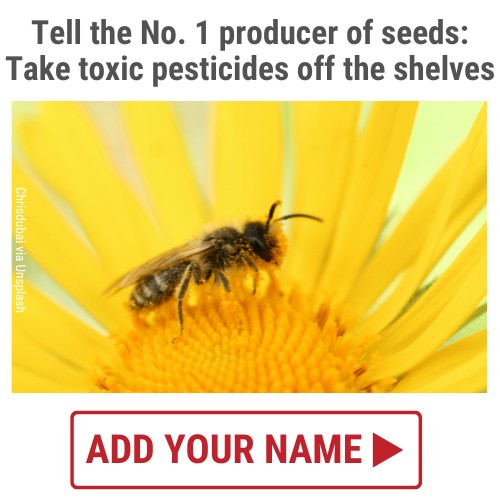
 |
John,
From one tiny seed that goes into the ground, toxic chemicals spread into groundwater, swirl into the air, and are absorbed by plants growing in the soil.1
Just one of these seeds is toxic enough to kill a songbird, and yet they could be planted on 150 million acres of farmland this year.2
We need to protect bees and other vital pollinators from these dangerous neonicotinoid-coated seeds. Tell Nutrien Ag Solutions, the nation's No. 1 seller of agricultural seeds: Stop selling neonic-coated seeds.
Many of the foods we rely on finding in our grocery stores -- apples, melons, broccoli -- need pollination to grow.3
But when bees land on a plant that was grown from a neonic coated seed, it can suffer an attack on its central nervous systems, causing overstimulation, paralysis and even death. Sometimes, bees carry neonics back to their hive, putting the entire colony in danger.4
And get this: Some studies found that the lethal effects of neonics on the natural predators of target pests actually reduced crop yields.5
Neonics are a bad idea for us, farmers and pollinators. Send a message to Nutrien Ag today and help get neonic seeds off the market.
When spring blooms next year, we want to know that the crops sprouting up from the ground aren't toxic to our most important pollinators. But that starts with the seeds being planted in the next few months, and whether they'll be soaked in dangerous chemicals, or not.
The best way for us to take action to get rid of neonic seeds is by going to the source, the companies that produce these seeds. Many farmers don't know that their seeds contain pesticide coatings because of limited options on the market.6
Nutrien Ag can make a difference for the bees and other crucial pollinators. Tell the company to pull neonic-coated seeds from its shelves.
Thank you,
Faye Park
President
1. Jim Kleinschmit, "Unknown Benefits, Hidden Costs - Neonicotinoid Seed Coatings, Crop Yields and Pollinators," Institute for Agriculture and Trade Policy, August 5, 2015.
2. S.D. Frank and J.F. Tooker, "Neonicotinoids pose undocumented threats to food webs," Proceedings of the National Academy of Sciences (PNAS), September 2, 2020.
3. Brianna Randall, "The Value of Birds and Bees," Farmers.gov, June 22, 2020.
4. Jim Kleinschmit, "Unknown Benefits, Hidden Costs - Neonicotinoid Seed Coatings, Crop Yields and Pollinators," Institute for Agriculture and Trade Policy, August 5, 2015.
5. "Benefits of Neonicotinoid Seed Treatments to Soybean Production," Environmental Protection Agency, last accessed August 4, 2023.
6. Sara LaJeunesse, "Pesticide seed coatings are widespread but underreported," Pennsylvania State University, March 17, 2020.
Support U.S. PIRG. Contributions by people just like you make our advocacy possible. Your contribution supports a staff of organizers, attorneys, scientists and other professionals who monitor government and corporate decisions and advocate on the public's behalf.
Join us on Facebook | Follow us on Twitter
U.S. PIRG, Main Office: 1543 Wazee St., Suite 460, Denver, CO 80202, (303) 801-0582
Federal Advocacy Office: 600 Pennsylvania Ave. SE, 4th Fl., Washington, DC 20003, (202) 546-9707
Member Questions or Requests: 1-800-838-6554.

If you want us to stop sending you email then follow this link -- unsubscribe.